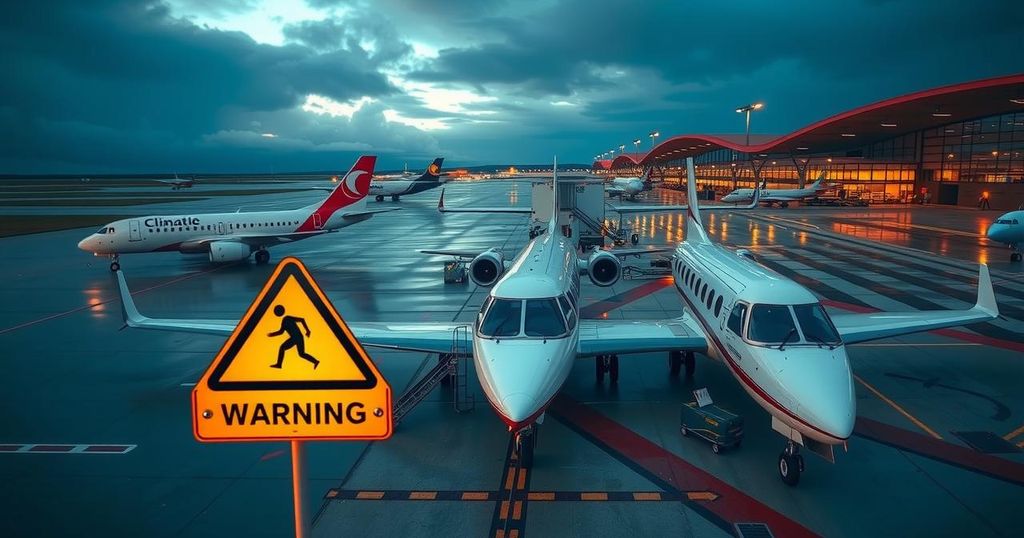Climate Scientists Warn of Rising Emissions from Ultra-Rich Jet Travel

Climate scientists warned that the ultra-rich are using private jets like taxis, leading to a 46% increase in emissions from 2019 to 2023. Flying in a private jet for an hour can emit more carbon dioxide than an average person produces in a year. With private flights generating significant carbon footprints, the study emphasizes the environmental responsibility of affluent travelers in the context of climate change.
Recent findings reveal that ultra-wealthy individuals are utilizing private jets akin to taxis, prompting warnings from climate scientists regarding the substantial environmental consequences. An analysis conducted by researchers identified a staggering 46% increase in carbon dioxide emissions between 2019 and 2023, attributable to private aviation. Their study revealed that a single hour of flying in a private jet emits more carbon dioxide than the average person produces in an entire year. The research scrutinized various private flights worldwide, including recreational trips and attendance at significant events like the FIFA World Cup and the UN climate conference in Dubai. Professor Stefan Gossling, the study’s lead researcher from Linnaeus University in Sweden, remarked on the casual approach many have towards air travel, stating, “There are a lot of people using these aircraft as taxis, where you cover whatever distance by aircraft simply because it is more convenient.” In 2023 alone, it is estimated that private jets emitted 15.6 million tonnes of carbon dioxide, equivalent to the emissions produced by approximately 3.7 million gasoline-powered cars annually. Although this figure represents only about 1.8% of all air travel emissions, the impact per individual is profound. Each ultra-rich individual traveling via private jets contributes more emissions than entire cities in parts of Africa, where per capita emissions are significantly lower. This considerable rise in emissions is attributed to heightened demand for private air travel, particularly following restrictions on commercial flights during the COVID-19 pandemic. The group identified as ultra-high-net-worth individuals comprises about 256,000 people globally, approximately 0.003% of the adult population, with an average net worth of $123 million. The researchers chose to anonymize specific individuals involved in excessive private flying, noting that numerous private jets were linked to leisure activities and events, with a significant number of these flights under 500 kilometers. Events such as the 2022 FIFA World Cup led to a spike in emissions, with nearly 1,900 private jets associated with the event generating substantial carbon output. Professor Gossling asserts that immediate action is imperative, emphasizing the urgency of reducing carbon emissions from the wealthiest travelers. He warned, “In 10 years, people will wish we had done a lot more in order to stop climate change.” The scientific community increasingly echoes this sentiment, highlighting the responsibility of the affluent to spearhead emissions reduction efforts. As climate-related barriers mount, the International Air Transport Association aims for net-zero emissions by 2050. However, doubts linger regarding the feasibility of achieving this goal while maintaining traditional air travel’s growth without exacerbating climate change.
The increasing use of private jets by the ultra-rich mirrors broader societal issues surrounding climate change and carbon emissions. With elite individuals taking frequent flights for convenience, the environmental ramifications are significant, particularly when juxtaposed against the average person’s carbon footprint. This research underlines a growing concern regarding equity in emission contributions and the stark contrasts in environmental impact between socioeconomic classes. The aviation sector’s role in carbon emissions is a critical aspect of global environmental discourse, especially with major events and leisure travel patterns contributing to air travel’s footprint.
The rising trend of ultra-wealthy individuals utilizing private jets as taxis poses a serious challenge to climate action efforts. The significant increase in carbon dioxide emissions highlights the need for immediate reform in aviation practices, particularly among those in the highest economic brackets. Addressing this issue requires collective responsibility and recognition of the influence that high-net-worth individuals hold in the climate change dialogue. The path toward sustainable air travel necessitates innovative solutions and a commitment from both the aviation industry and wealthier demographics to curtail their environmental impact.
Original Source: www.bbc.com






